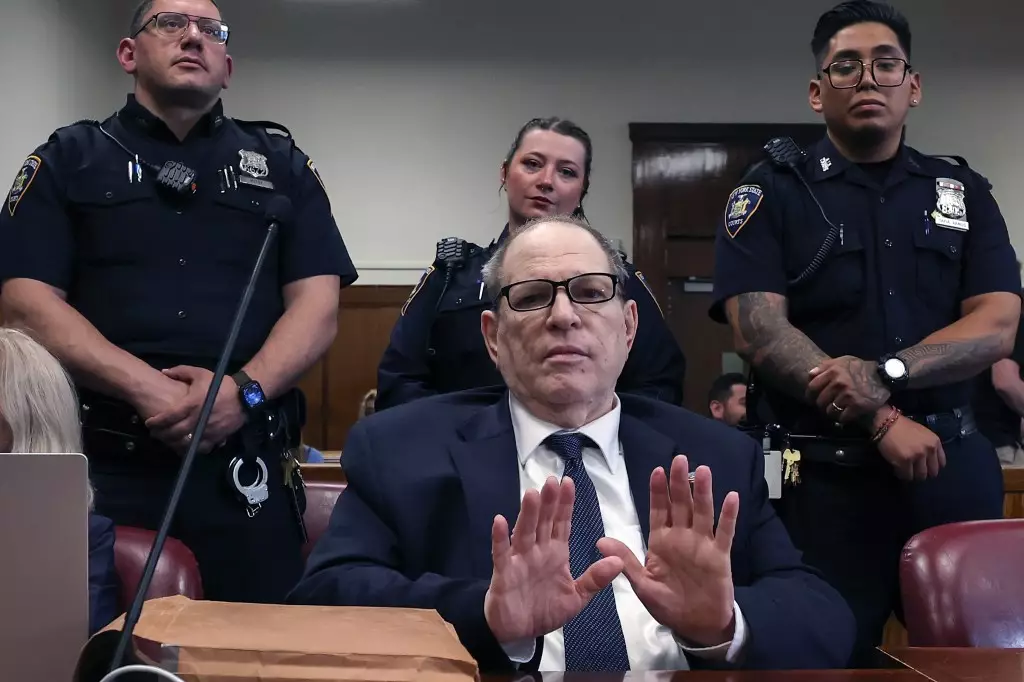In the tumultuous world of courtroom proceedings, few cases have drawn as much public attention as that of Harvey Weinstein. Once a towering figure in Hollywood, Weinstein’s name became synonymous with scandal when multiple allegations of sexual misconduct surfaced. As he faces yet another round in the courts, his decision to remain silent during his New York rape retrial raises significant questions about strategy, image management, and the complex nature of justice in high-profile cases.
Weinstein, whose legal team initially feared for his health and well-being during the trial, has opted not to take the stand this time around. His spokesperson, Juda Engelmayer, indicated that although Weinstein desired to testify, the potential repercussions outweighed the benefits. This moment illustrates the classic dilemma faced by defendants: the innate desire to voice their truth versus the strategic retreat into silence, which can often be perceived as a defensive maneuver.
The Overarching Media Landscape
Adding layers to this narrative, Weinstein has not entirely withdrawn from the public eye. He has orchestrated a guerrilla marketing campaign of sorts through selective media appearances, like the controversial interview with Candace Owens. In these appearances, he asserts his innocence, even as he is engulfed in allegations that have caused irreparable damage to his reputation and career. He claims, “I swear that before God and the people watching now and on my family. I’m wrongfully accused,” aiming to reclaim some semblance of control in a landscape dominated by #MeToo advocates and survivors seeking justice.
This contradiction—his silenced courtroom presence juxtaposed with his active media campaign—highlights the multifaceted approach defendants like Weinstein often adopt. It exemplifies how public perception can be as powerful as the legal arguments presented in court, shaping narratives that deeply influence both juries and public opinion.
The Legal Chess Match
As the trial approaches its conclusion, with closing arguments anticipated imminently, Weinstein’s defense team, led by attorney Arthur Aidala, has crafted narratives that challenge the credibility of the accusations against him. By framing interactions with his accusers as consensual “friends with benefits” relationships, the defense attempts to shift the focus from predatory behavior to mutual consent—a strategy that has been met with skepticism in light of the broader discussions surrounding consent and power dynamics in the wake of the #MeToo movement.
Additionally, Weinstein’s prior legal troubles, including a prior rape conviction with significant media coverage and resulting public outrage, complicate his current situation. The addition of a new count of Criminal Sexual Act in the First Degree to the indictment underscores the ongoing nature of the case against him and reflects the evolving landscape of legal definitions surrounding sexual misconduct.
Cultural Shifts and Community Response
The context of Weinstein’s retrial extends beyond the courtroom and into societal conversations about sexual violence, justice, and accountability. How his case is perceived will likely reverberate through discussions on consent, the stories of survivors, and the institution’s role in enabling or dismantling systemic abuses of power. The voices of those advocating for change in Hollywood and beyond frame the individual story of Weinstein as part of a broader narrative that seeks to redefine boundaries and expectations regarding consent and consequences for offenses, particularly in influential positions.
The sentiment surrounding Weinstein’s retrial is not merely a legal issue; it is emblematic of society’s long-overdue reckoning with past behaviors, expectations, and the need for assurance that the scales of justice are neither tipped by celebrity nor coercive power.
Through the sanctioned labyrinth of testimony bans, media maneuvers, and legal stratagems, Weinstein’s situation serves as both a cautionary tale for the status quo and a critical chapter in the evolving American discourse on sexual misconduct and survivor rights. The courtroom may be quiet in the wake of his decision to remain silent, but the echoes of his actions and their surrounding implications scream louder in the halls of cultural transformation.
